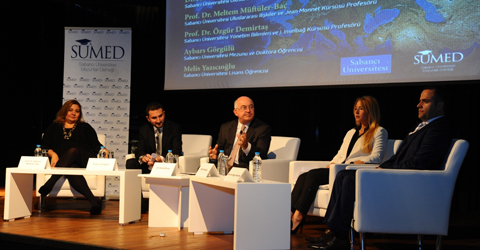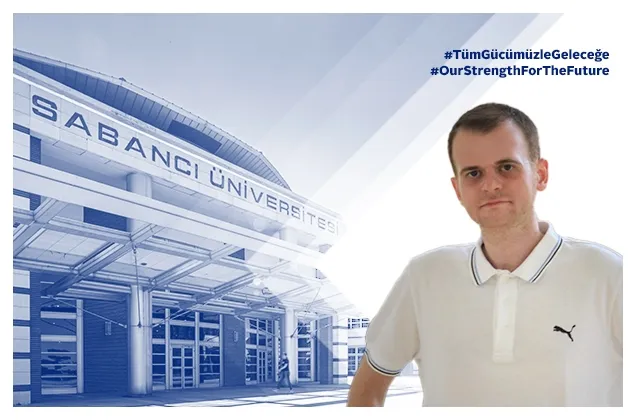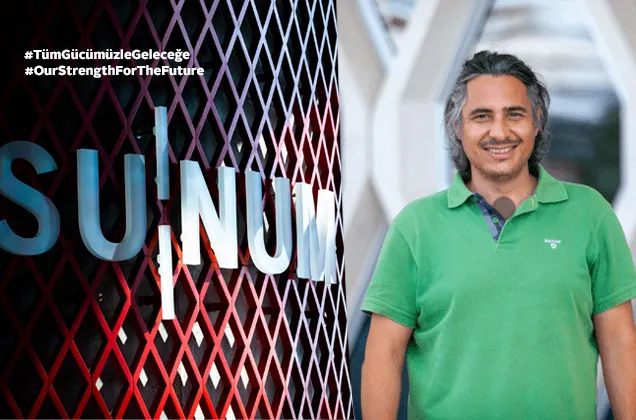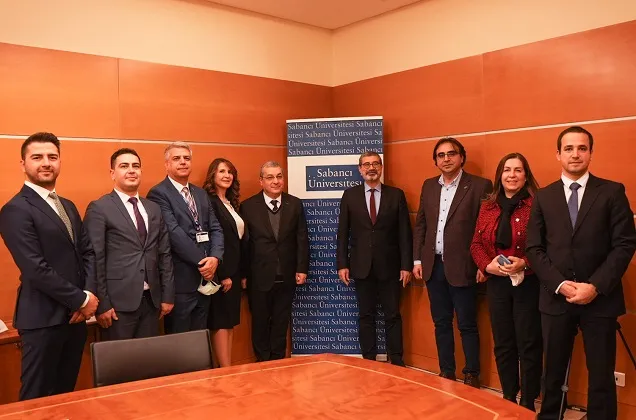08/10/2013
The Sabancı University International Board of Overseers meeting featured a panel discussion on “Turkey, Europe and the World” hosted by the Sabancı University Alumni Association.
Sabancı University International Board of Overseers Member Dr. Kemal Derviş, Sabancı University Faculty Member and Jean Monnet Professor Meltem Müftüler Baç, Sabancı University Finance Chair President Professor Özgür Demirtaş, graduate student Aybars Görgülü and undergraduate student Melis Yazıcıoğlu discussed the changing balance of the world and the position of Turkey.

As part of the Sabancı University International Board of Overseers meeting, a panel discussion on“Turkey, Europe and the World” was hosted by the Sabancı University Alumni Association (SUMED) on Thursday, October 3rd, 2013 at the Sakıp Sabancı Museum – the Seed with keynotes by Sabancı University International Board of Overseers Member Dr. Kemal Derviş, Sabancı University Faculty Member and Jean Monnet Professor Meltem Müftüler Baç, Sabancı University Finance Chair President Professor Özgür Demirtaş, graduate student Aybars Görgülü and undergraduate student Melis Yazıcıoğlu.
“Our performance is unstable”
Kemal Derviş discussed foreign policy, the economy and politics under separate headings. Derviş argued that a new world order was being formed in foreign policy, and said that significant ground had been covered in the economy in the past 12 years. Derviş said that Turkey was second only to China in terms of growth in 2010 and 2011, and continued, “Then the growth rate dropped vastly. Last year, it was below 2.5%. Our performance is unstable, but the quality of the products manufactured in Turkey improved nevertheless. There are pleasing developments in many areas.” Derviş said that great progress had been achieved despite all criticism and shortcomings, and that the current bottleneck was not unique to Turkey.
Derviş also commented on global developments, explaining how the great expectations from emerging nations until the month of May suddenly turned to pessimism, adding “The current deficit in Turkey is too great. When growth decreases, so does current deficit, but closing or reducing the deficit by growing slowly is not desirable. Turkey’s greatest structural issue is to accelerate growth while reducing current deficit and improving the funding quality for the current deficit.”
“There is a global issue with the quality of democracy”
Speaking on politics, Kemal Derviş said that there was an issue with the quality of democracy which was not unique to Turkey.
Derviş said, “The federal government in the United States has literally packed up. The polarization in a vastly advanced democracy is so great that the Congress cannot ratify a budget,” arguing that this was sad news for America as well as the world.
“Individual polarization in the United States is greater than that in Turkey”
Kemal Derviş discussed polarization in Turkey, saying "Polarization is not so great on an individual level in Turkey; I think the situation is worse in the United States, at least on an individual basis. People are more understanding of each other in Turkey. Things that were bitter issues 10 years ago aren’t anymore. There are vital issues of course, like the peace process. We must build the next century together with our Kurdish citizens.”
“The order will change with the shrinking of Europe and the growth of non-liberal countries”
Professor Meltem Müftüler Baç of the Sabancı University Faculty of Arts and Social Sciences discussed economic power, military power and population in her lecture, providing insight into the expected changes in the next 40 years. Meltem Müftüler Baç began by discussing Turkey’s global position in these three areas, and continued, “The world order we have been accustomed to so far is liberal at its core. The order will change with the shrinking of Europe and the growth of non-liberal countries. We may have to confront an unstable order in the future.”
Sabancı University Finance Chair President Özgür Demirtaş compared Turkey with Southern European countries in terms of budget deficit, debt ratio and per capita debt, explaining that Turkey was better off compared to these countries.
Aybars Görgülü discussed Turkey’s relations with its neighbors, while Melis Yazıcıoğlu spoke on Turkish-European relations based on university students.
The conference was also attended by Sabancı University Board of Trustees Chair Güler Sabancı and President Professor Nihat Berker.
Sabancı University International Board of Overseers
The Sabancı University International Board of Overseers is composed of 11 global business and academic leaders. Its members are:
United Kingdom Atomic Energy Authority Emeritus President Barbara Thomas Judge
Paradigm Ventures President Candace Johnson, one of the 50 most influential women in the world by Time and Fortune
Newtonmore Advisors Limited CEO Cem Cesmig
GE International President and CEO Ferdinando Beccalli-Falco
Brookings Institution Vice President and Sabancı University Istanbul Policy Center Senior Advisor Dr. Kemal Derviş
Bekaert President Baron Paul Buysse
Massachusetts Institute of Technology Faculty Member and Nobel Laureate in Economics Professor Peter A. Diamond
US Policy Metrics Founding Partner Senator Phil Gramm
Deutsche Bank Former Chair of the Board of Auditors Dr. Rolf E. Breuer
The Hong Kong Polytechnic University President Professor Timothy W. Tong
Orrick, Herrington & Sutcliffe LLP Partner Dr. Xiang Wang





